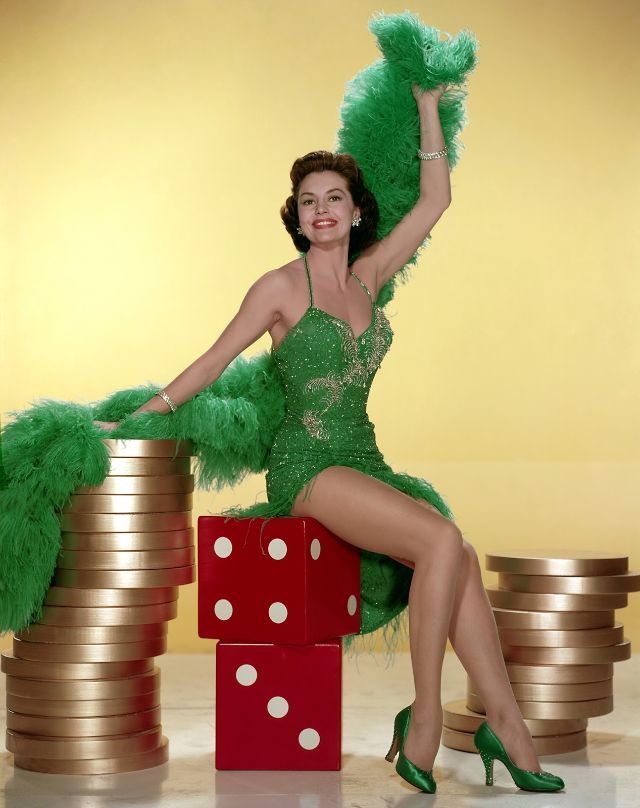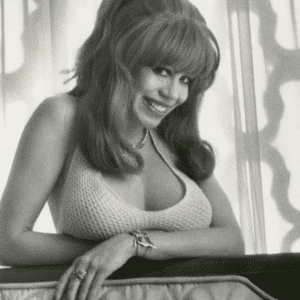In a town where voices screamed for attention and faces blurred into one another, Cyd Charisse never had to say a word. Her body spoke in a language all its own—fluid, fierce, and utterly mesmerizing. With every leap and glide, she told stories that no script could match. She didn’t just dance; she commanded the frame. She didn’t perform; she transformed.
Cyd wasn’t the kind of star who demanded the spotlight—it found her, naturally, effortlessly. Whether sharing a stage with Gene Kelly or Fred Astaire, she didn’t play second fiddle. She was the moment. And even decades later, she remains a symbol of what happens when discipline meets art, when beauty finds purpose, and when a ballerina teaches Hollywood how to truly move.

From Texas Roots to Tinseltown Royalty
Born Tula Ellice Finklea in Amarillo, Texas, in 1922, Cyd’s beginnings were anything but glamorous. At just six years old, she was struck with polio—a diagnosis that could’ve derailed any dream of physical greatness. But not hers.
Instead of letting it define her, she danced through it. Quite literally. Her parents enrolled her in ballet as a form of therapy, and that turned into obsession. From childhood pliés to elite studios across America and Europe, she trained with a hunger you couldn’t teach.
Her name may have changed along the way, but the fire inside her didn’t. From Amarillo’s dusty fields to MGM’s glossy sets, Cyd Charisse brought the grit of Texas and the grace of Paris to every role she took.
Video: Movie stars dancing to…’I’m So Excited!’
The Dancer Who Didn’t Need Dialogue
Let’s be honest—most Hollywood stars rely on lines. But Cyd? She was a silent storm. You couldn’t take your eyes off her, even when she wasn’t speaking. Her body did the talking. Her eyes carried meaning. And when she danced, it wasn’t just choreography—it was poetry in motion.

In Singin’ in the Rain, she swirled through the fantasy sequence with Gene Kelly, a vision in green with legs that seemed to go on forever. She didn’t utter a word—and yet that scene is one of the most unforgettable moments in cinema.
That’s the thing with Cyd: she didn’t steal scenes with noise—she owned them with nuance.

The MGM Golden Era: Elegance Meets Endurance
When she signed with MGM, the powerhouse behind Hollywood’s most iconic musicals, Cyd stepped into a league of legends. But while many actresses sang or smiled their way through scenes, she brought discipline, athleticism, and fire.

In The Band Wagon, she teamed with Fred Astaire for one of the most refined duets ever captured on film. Their “Dancing in the Dark” number wasn’t just a performance—it was a moment of two masters merging. Pure cinematic alchemy.
But behind the scenes? It was hard work. Brutal rehearsals. Bleeding toes. Endless takes. And yet, Cyd never complained. She rehearsed until every movement was flawless. She wasn’t there to look good—she was there to be great.
Legs for Days, Soul for Miles
Video: FRED ASTAIRE and CYD CHARISSE – Dancing in the dark, at the Central Park
Sure, the press loved to talk about her legs. After all, they were insured for a million dollars—a publicity move that turned heads. But anyone who reduced Cyd to body parts missed the point entirely.
Because what made her special wasn’t her legs—it was her soul.

She danced like she was telling you a secret. Every spin, every pause, every tilt of the head had purpose. She fused ballet with jazz, grace with passion, and gave classic dance a modern, emotional heartbeat.
She didn’t just elevate musicals—she elevated what it meant to move with meaning.
Life After the Lights: Grace Beyond the Frame

When the curtain began to fall on Hollywood’s golden age, many stars faded with it. But not Cyd. She didn’t cling to fame. She stepped away quietly, choosing family over flash, authenticity over attention.
Her marriage to singer Tony Martin became one of the most enduring and rare love stories in the entertainment world. Over 60 years of partnership—marked not by tabloid scandals, but by love, respect, and shared artistry.

And while she occasionally returned for tours and specials, she did so with elegance, never trying to chase her youth or revive old glories. She knew who she was. She knew what she’d given. And she was content.
A Legacy That Keeps Moving

Cyd Charisse may have danced her last on film decades ago, but her presence still moves through time. Film schools study her work. Dancers mimic her lines. Choreographers pay tribute. Why? Because she made dance cinematic. She made it cool. She made it count.

She proved that movement could be a leading role. That elegance doesn’t age. That power doesn’t have to shout.
In a world that often rewards flash over substance, Cyd left us something deeper—a roadmap for graceful excellence.

Conclusion: When She Danced, the World Held Its Breath
Cyd Charisse didn’t need words to leave her mark. Her legacy isn’t just in the steps she took, but in the emotion behind them. She rose from illness to inspire millions, brought ballet to the big screen, and turned Hollywood’s eyes toward a new kind of star—one who spoke through silence, who captivated with a glance, and who turned every stage into sacred ground.

She wasn’t just a dancer. She was the rhythm of an era. And even now, decades later, she reminds us of the power of pure, unfiltered artistry.
Long legs? Yes. But it was the long-lasting impact that truly defined her.


